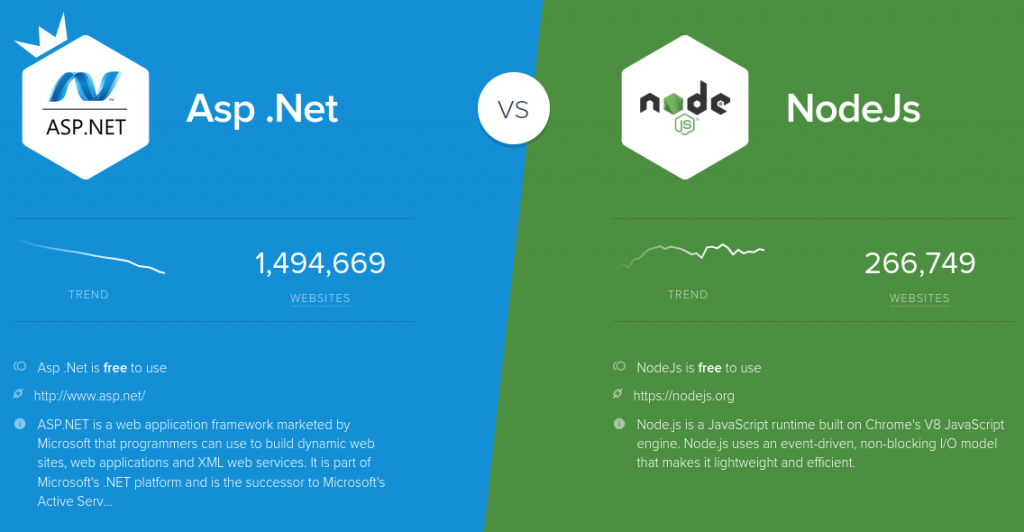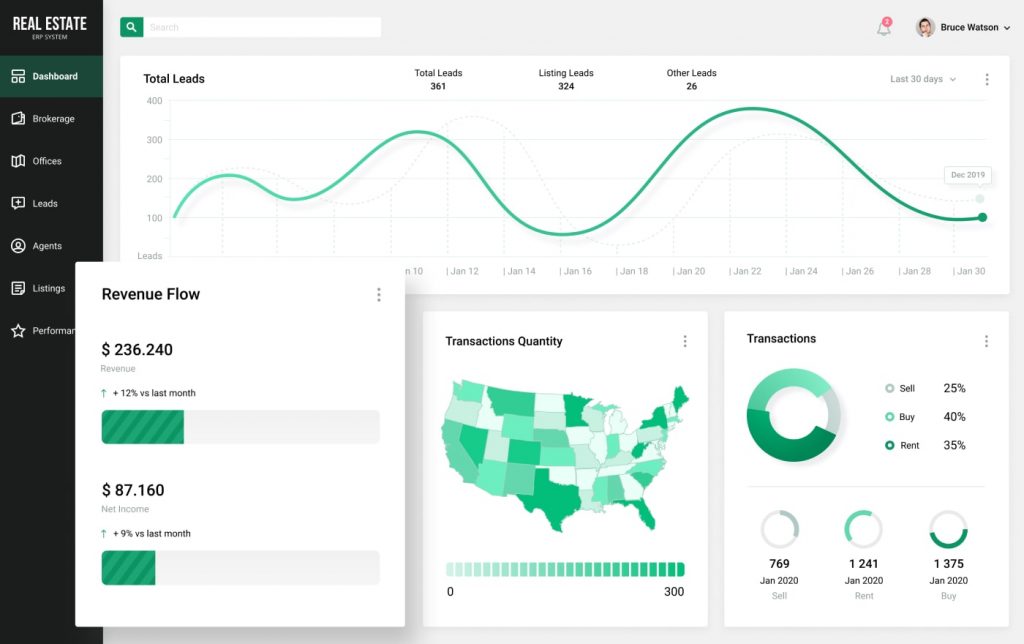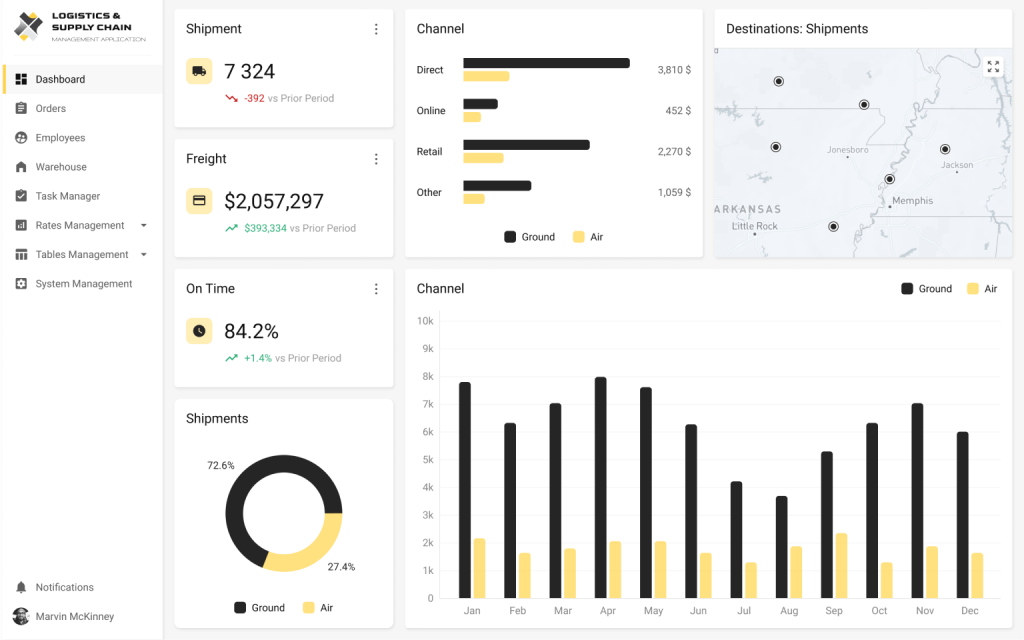
In the rapidly advancing realm of software development, the backend is the crucial engine that powers the digital landscape and breathes life into what we see on the screens of our devices. As the demand for reliable high-performing, scalable, and efficient applications continues to soar, there are plenty of options for developers to choose from. Two prominent contenders, Node.js and .NET, have earned themselves titles of go-to frameworks for backend development.
In this article, we'll compare Node.js and .NET to outline their advantages and areas of use. Whether you're coding for fun or looking for a suitable tech to turn your startup into a unicorn company one day, we hope this info will help you build the best platform for your projects.

Source: SimilarTech
Node.js
Let's start with a brief introduction. Node.js, built on Chrome's V8 JavaScript engine, has gained immense popularity for its event-driven, non-blocking I/O model. It has empowered developers to build scalable apps with ease. Its lightweight and efficient nature, coupled with a vast ecosystem of modules and libraries, has made it a top choice for handling data-intensive tasks, microservices, and real-time web and mobile applications. In 2023, Node.js development continues to thrive, with an ever-growing community and a vibrant ecosystem that fosters innovation and collaboration.
Why Developers Love It
Apps as fast as a shark. Node.js applications are renowned for their exceptional performance. Here, development companies can rely on the V8 JavaScript engine, developed by Google for the Chrome browser that executes JavaScript code with remarkable speed. Node.js utilizes a single-threaded, event-driven architecture, allowing it to efficiently handle concurrent connections and I/O operations.
Grow your app as you need it. Scaling software systems to handle increased user demand is critical for backend development. Node.js excels in this realm thanks to its lightweight and scalable nature. Programmers can effortlessly manage many concurrent connections, making Node.js a well-suited choice for solutions that require high scalability.
The extensive tool set. The Node.js development ecosystem is vibrant and thriving, offering a vast array of modules, libraries, and tools. The Node Package Manager (npm) is a cornerstone of this ecosystem that enables easy access to a wealth of pre-built packages and dependencies. For example, the Node.js for mobile apps React Native plugin helps to deliver mobile applications. Here, you can reap all the benefits of using React for building the UI and use Node.js as a runtime environment.
Read Also How Node.js Libraries Can Improve Your Logging
Quick development. Node.js promotes a rapid development cycle, enabling programmers to iterate quickly and bring the product to market faster. Its JavaScript-based syntax, coupled with a vast selection of libraries, empowers developers to build prototypes swiftly and experiment with new ideas efficiently.
Robust community. Node.js boasts an extensive and passionate community of enthusiasts who actively contribute to its growth and provide support to fellow developers. It offers a wealth of resources, including forums, online communities, and tutorials, where anybody can seek assistance, share knowledge, and collaborate on projects. The collective wisdom and expertise of the Node.js admirers serve as a valuable asset, helping coders overcome challenges and stay updated with the latest trends and best practices.
What is Node.js Good For?
Real-time applications. Node.js is well-suited for building real-time solutions that require instant data updates and seamless communication between clients and servers. Chat apps, collaborative tools, and multiplayer gaming platforms can leverage Node.js to deliver responsive and interactive experiences to users.
Data-Intensive solutions. With its non-blocking, event-driven architecture, Node.js shines when handling data-intensive tasks. For example, applications dealing with real-time analytics and data processing can benefit from Node.js's ability to manage concurrent connections and efficiently handle large volumes of data.

Source: 360° ERP System for Real Estate
Microservices architecture. Node.js's lightweight nature and scalability make it an excellent choice for developing microservices-based architectures. By breaking down a complex system into smaller, modular services, developers build scalable and resilient systems that can be easily maintained and updated.
Read Also Monolithic vs Microservices Architecture
APIs and backend services. Node.js is widely used for developing APIs and backend services that power web and mobile apps. Its fast and efficient execution, coupled with a vast ecosystem of libraries and frameworks, helps build and deploy robust APIs, enabling seamless communication between client applications and servers.
Streaming platforms. Thanks to its event-driven nature, Node.js is a decent choice for building streaming applications, such as video streaming platforms or audio streaming services.
.NET
Now, let's look at the second development technology. Microsoft's .NET framework, known for its robustness and versatility, has been a reliable choice for enterprise-level solutions for decades. With the introduction of .NET 5 and the subsequent releases, Microsoft has embraced open-source principles, allowing development teams to use it across multiple platforms. With extensive library support and mature tooling, .NET developers create high-performance web services, APIs, and complex business apps. The framework's seamless integration with Microsoft Azure further enhances its appeal.
.NET Best Features
Separation of concerns. A modular approach allows developers to compartmentalize different aspects of an application, such as business logic, presentation, and data access. This separation enhances code maintainability and enables teams to work collaboratively and independently on different parts of the system.
Faster coding. Libraries and frameworks like ASP.NET and Entity Framework help rapidly build and deploy software. The availability of code snippets, templates, and ready-to-use modules further reduces coding time, enabling developers to focus on business-specific logic and deliver applications in shorter time frames.
Multi-language support. .NET speaks in many languages. It supports, for example, C#, F#, or even Visual Basic if you love antiques. Such a feature helps developers choose the language that suits their project requirements and expertise better.
High-security standards. .NET enables built-in security mechanisms, such as role-based authentication, data encryption, and secure communication protocols, safeguarding applications against potential threats.
Monitoring tools. With the introduction of .NET Core, constant monitoring in development is easier than ever. Built-in performance monitoring and diagnostics tools enable programmers to identify and resolve issues efficiently. Also, Azure Application Insights integration provides powerful analytics capabilities.
When You Should Use .NET
Enterprise applications. .NET is a prime choice for enterprise-grade systems development. Its robustness, scalability, and extensive library support make it ideal for developing complex business systems, CRM tools, supply chain management solutions, and ERP software. The framework's ability to integrate seamlessly with Microsoft's ecosystem, including Azure cloud services, helps deliver state-of-the-art SaaS solutions.
Web applications. With frameworks like ASP.NET, you can use the model-view-controller (MVC) pattern, enabling efficient separation of concerns and facilitating the development of scalable, maintainable, and responsive web applications.

Source: Logistics and Supply Chain Management Application
Desktop Applications. The .NET framework provides a robust foundation for developing desktop apps running on Windows. Developers can create visually appealing and functional software products with Windows Presentation Foundation (WPF) and Windows Forms.
Mobile Applications. With Xamarin, a cross-platform mobile development framework, you can build native mobile apps for multiple platforms using a shared codebase. .NET's integration with Xamarin.Forms further simplifies the development process by enabling the creation of a single user interface (UI) that adapts to different platforms.
Conclusions
Both frameworks offer distinct advantages and cater to different needs, making it crucial for developers to carefully evaluate their project requirements before choosing. Node.js's event-driven, non-blocking architecture makes it ideal for scalable, real-time solutions while .NET's robust ecosystem and seamless integration with Microsoft technologies make it a reliable choice for enterprise-level projects. Ultimately, the decision between Node.js and .NET boils down to specific use cases, development team expertise, and project goals.



























